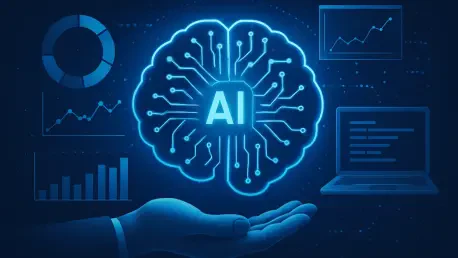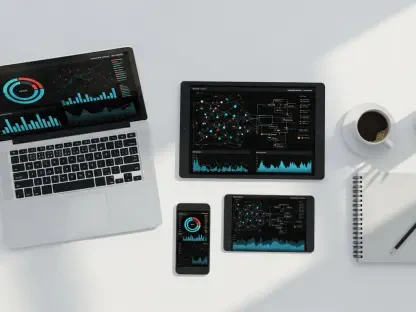In an era where data drives decisions, businesses face the challenge of harnessing real-time information to fuel artificial intelligence tools effectively, and imagine a scenario where AI assistants can instantly access live business data from multiple systems. They can analyze it and take actionable steps without complex integrations or security risks, making this no longer a distant vision but a reality with innovative solutions transforming how enterprises interact with their data. Skyvia, a leading data integration platform, has introduced a groundbreaking service known as MCP Server, designed to bridge the gap between AI assistants and live business data. Utilizing the open Model Context Protocol (MCP), this service allows secure, real-time access to information from over 200 cloud apps and databases. By simplifying connectivity and ensuring data-driven insights, MCP Server empowers organizations to leverage AI for faster, smarter decision-making, setting a new standard for operational efficiency and responsiveness in dynamic markets.
1. Unveiling the Core Features of MCP Server
The MCP Server stands out for its ability to simplify complex data interactions for AI tools, offering a no-code setup that eliminates the need for technical expertise. Enterprises can establish MCP endpoints in mere minutes using an intuitive wizard, bypassing the traditional hurdles of coding or API management. This accessibility ensures that teams across various departments, from marketing to operations, can quickly connect their systems to AI assistants. Beyond ease of use, the service provides governed access to live data, ensuring that AI responses are based on the most current information available from CRM, ERP, and database systems. This real-time connectivity is critical for industries where timing can make or break a decision, such as retail or finance. By removing barriers to implementation, MCP Server enables businesses to focus on leveraging AI insights rather than wrestling with backend complexities, thus streamlining workflows and enhancing productivity across the board.
Another key strength of MCP Server lies in its robust handling of API intricacies and enterprise-grade security measures. The platform abstracts challenges like rate limits, schema management, and pagination, managing these behind the scenes across an extensive array of connectors. This means that teams can connect to diverse data sources, including Salesforce, HubSpot, and Google Sheets, without worrying about technical limitations. Additionally, security is prioritized with features like IP allowlists, passwords, and encryption, safeguarding sensitive business information. The ability to expose data and actions from multiple sources—be it CRMs, ERPs, or spreadsheets—further enhances its utility, making it a versatile tool for organizations of all sizes. This combination of seamless integration and stringent security protocols ensures that AI assistants operate within a protected environment, delivering reliable outputs while maintaining data integrity and confidentiality.
2. Transforming AI Interactions with Real-Time Capabilities
One of the most transformative aspects of MCP Server is its capacity to enable AI assistants to move beyond merely answering queries to executing real-time actions. Businesses can now use natural language to generate on-demand reports and insights, pulling together summaries of sales, marketing, and financial data from disparate systems. This capability accelerates data-driven decision-making, allowing leaders to respond promptly to market shifts or internal needs. For instance, a sales manager could request an instant performance overview across multiple platforms and receive a consolidated report without manual intervention. Such efficiency not only saves time but also reduces the risk of human error in data compilation. By connecting AI directly to live business data, MCP Server ensures that every insight or recommendation is grounded in the latest information, providing a competitive edge in fast-paced environments.
Furthermore, the service empowers AI to take immediate actions based on the data it accesses, revolutionizing operational workflows. Beyond generating insights, AI assistants can add new records to a CRM, create follow-up tasks, or update existing data entries—all through simple commands. This functionality is invaluable for roles like analysts and product managers who need to act swiftly on insights without navigating multiple systems manually. The no-code, real-time access to business systems means that even non-technical staff can utilize AI to perform complex tasks efficiently. Supported by the open Model Context Protocol, MCP Server presents data sources as executable functions that AI can discover and invoke securely. This direct line of action transforms how teams interact with their tools, fostering a more agile and responsive organizational structure where decisions and implementations occur almost simultaneously.
3. Simplifying Integration Through a Universal Protocol
At the heart of MCP Server’s innovation is its reliance on the open Model Context Protocol, a standard that streamlines how AI integrates with external systems and data sources. This protocol allows large language models to interact with business data through a universal interface, making it easier for AI agents to discover and utilize tools without custom configurations. The process begins with creating a connection to one of over 200 supported data sources, such as PostgreSQL or Salesforce, which can be done in just a few clicks. Following this, users can set up an MCP endpoint using a visual wizard, configuring security settings like IP allowlists if needed. This structured approach ensures that AI assistants can access live data securely and efficiently, providing a standardized method for interaction that reduces integration friction across diverse platforms and applications.
The practical application of this protocol through MCP Server also means that connecting to AI clients is straightforward and effective for real-time data handling. Once an endpoint is established, linking it to an MCP-compatible AI assistant allows users to ask questions, receive answers, and execute actions seamlessly. This integration is particularly beneficial for organizations managing multiple data sources, as it consolidates access into a single, manageable interface. The ability to use natural language for queries further democratizes data access, enabling staff at all levels to interact with complex systems without specialized training. By leveraging this open standard, MCP Server not only enhances the functionality of AI tools but also ensures scalability, allowing businesses to adapt and expand their data integrations as needs evolve, maintaining a future-ready posture in an ever-changing technological landscape.
4. Reflecting on a Data-Driven Milestone
Looking back, the introduction of MCP Server marked a significant leap forward in how businesses integrated AI with live data systems. Its no-code setup and real-time access capabilities reshaped operational dynamics, allowing teams to harness AI for both insights and actions with unprecedented ease. The robust security features and multi-source connectivity provided a foundation of trust and versatility, ensuring that sensitive information remained protected while diverse data streams were unified under a single platform. For many enterprises, this solution became a cornerstone for accelerating decision-making processes, reflecting a pivotal shift towards more agile and informed strategies. As organizations adapted to this technology, the open Model Context Protocol proved instrumental in standardizing AI interactions, paving the way for broader adoption. Moving forward, businesses were encouraged to explore MCP Server’s potential further, integrating it into their workflows to unlock new efficiencies and maintain a competitive edge in data-driven innovation.









